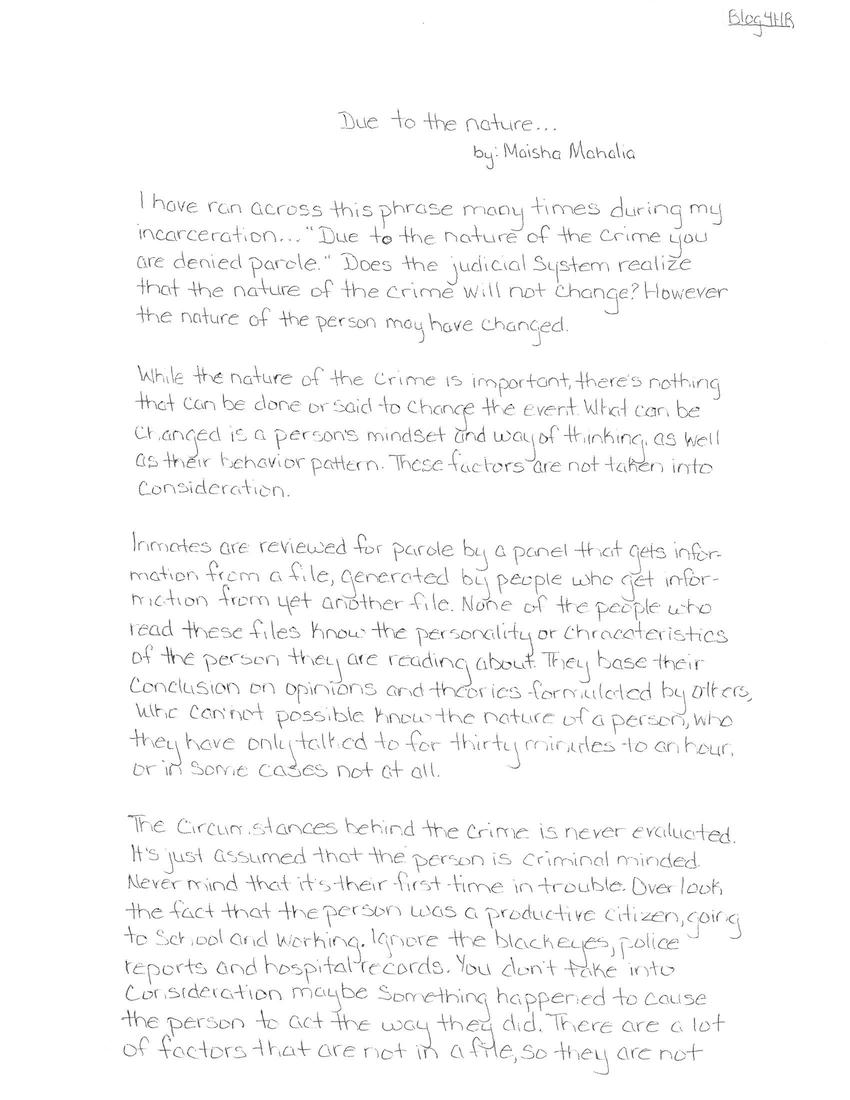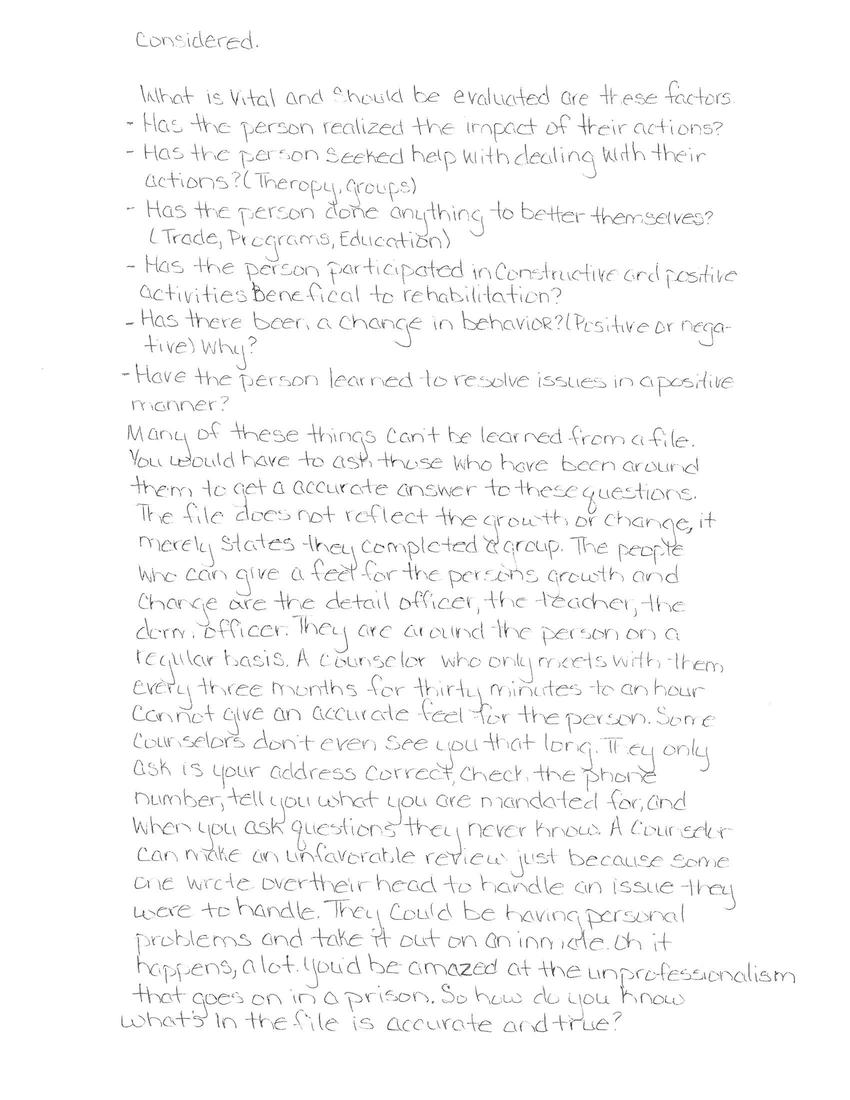
Transcription
Blog 4HR
Due to the nature...
by Maisha Mahalia
I have run across this phrase many times during my incarceration..."Due to the nature of the crime you are denied parole." Does the judicial system realize that the nature of the crime will not change? However the nature of the person may have changed.
While the nature of the crime is important there's nothing that can be done or said to change the event that. What can be changed is a person's mindset and way of thinking as well as their behavior pattern. Those factors are not taken into consideration.
Inmates are reviewed for parole by a panel that gets information from a file, generated by people who get information from yet another file. None of the people who read these files know the personality or characteristics of the person they are reading about. They base their conclusion on opinions and theories formulated by others, who cannot possibly know the nature of a person who they have only talked to for thirty minutes to an hour, or in some cases not at all.
The circumstances behind the crime are never evaluated. It's just assumed that the person is criminal minded. Never mind that it's their first time in trouble. Overlook the fact that the person was a productive citizen, going to school and working. Ignore the black eyes, police reports and hospital records. You don't take into consideration maybe something happened to cause the person to act the way they did. There are a lot of factors that are not in a file, so they are not considered.
What is vital and should be evaluated are these factors:
-Has the person realized the impact of their actions?
-Has the person seeked help with dealing with these actions? (Therapy groups)
-Has the person done anything to better themselves? (Trade Programs, Education)
-Has the person participated in constructive and positive activities beneficial to rehabilitation?
-Has there been a change in behavior? (Positive or negative)? Why?
-Has the person learned to resolkve issues in a positive manner?
Many of these things can't be learned from a file. You would have to ask those who have been around them to get an accurate answer to their questions. The file does not reflect the growth or change, it merely states they completed a group[?] The people who can give a feel for the persons' growth and change are the detail officer, the teacher, the dorm officer. They are around the person on a regular basis. A counselor who only meets with them every three months for thirty minutes to an hour cannot give an accurate feel for the person. Some counselors don't even see you that long. They only ask is your address correct, check the phone number, tell you what you are mandated for, and when you ask questions they never know. A counselor can make an unfavorable review just because someone wrote over their head to handle an issue they were to handle. They could be having personal problems and take it out on an inmate. [?]Oh it happens, a lot you'd be amazed at the unprofessionalism that goes on in a prison. So how do you know what's in the file is accurate and true? When the judicial system stops looking at the nature of the crime, and starts evaluative the nature of the person, justice can begin to be served.
An example of how the nature of a person can change, is told in the Bible. Saul, who prosecuted and destroyed Christians, who in hte end was their most devoted leader.
Other posts by this author
|
2020 dec 12

|
2019 apr 5

|
2019 apr 3

|
2019 apr 1

|
2019 jan 11

|
2019 jan 8

|
More... |




Replies (2)
I hope you keep up the writing!
Already over a year ago, I (and my assistent Jennifer) can to Pulaski to make portraits. You were one of the people I portrayed. I sent your (and all the others') portraits to Pulaski, and as far as I know, you must have received that photo.
I have to apologize for not having posted the work on my website (www.janbanning.com) publicly, as I promised: I have to do this work in my spare time, and I don't have much of that.
The photos are on the site, but still behind a password (Pulaski123).
But soon, a first series of portraits and texts will be 'unlocked'. I'm afraid there is no way for you to see the work, but let me explain briefly what my intention is, below.
I have an important question: is it OK for you if I also post your texts from “Inkspills”? I hope you are able to answer to this.
The goals of the post:
Aim 1: Challenge our views on criminality.
I am not condoning crime. I just refuse to accept that people who committed one are fundamental different from us, that they are the bad guys as opposed to us, the goodies. What about you? Are you sure that decent citizens are better human beings than these inmates? In the past, I for one have done something that could have landed me in prison. But since I was not caught, I am one of the flawless.
And do we really want to limit ourselves to punishing them, even though no connection has been proven between imprisonment and crime rates? Or is there more than cynicism in the term “Department of Corrections”?
Aim 2. Question the role of the internet.
We as a society have decided that the consequence of committing a serious crime is serving time in prison. If and when a person has served that, he/she is entitled to start a new life.
But recently, a second – life - sentence has been added, so far especially in the USA, by a new form of people’s tribunal outside of the democratic decision-making process: offenders’ names, faces and other information are put on the internet.
The availability of this is bound to have a strong impact on former inmates’ lives and their chances to move on to a new, non-criminal life – if only because the big mayority of U.S. employers performs criminal background checks on prospective employees.
Of course, I can tell you more about it - if you like.
I hope you are doing well - at least as good as is possible, under the circumstances. I also hope we will be able to communicate via this blog.
Best regards and good luck from Utrecht, the Netherlands,
Jan Banning
info@janbanning.com